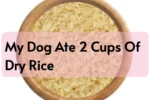Pepperoni and Dogs: A Safe Combination?

While dogs may beg for a piece of pepperoni when their owners are enjoying it, it is not recommended to give them this treat. Pepperoni is a highly processed and fatty meat that can cause gastrointestinal upset and potentially lead to pancreatitis and obesity in dogs. The high salt and spice content can also be harmful to their health. It is best to avoid feeding pepperoni to dogs and opt for safer alternatives such as fish, chicken, or liver.
Key Takeaways:
- Pepperoni is not recommended for dogs due to its high fat and salt content.
- Feeding pepperoni to dogs can potentially cause gastrointestinal upset, pancreatitis, and obesity.
- It is best to avoid giving dogs pepperoni and choose safer alternative protein sources such as fish, chicken, or liver.
Is Pepperoni Safe for Dogs to Eat?
Pepperoni is not toxic to dogs, but it is not an ideal food or treat for them. While a small amount of pepperoni may not cause serious problems, even a small amount can make them feel ill. It is important to understand the potential effects that pepperoni can have on dogs.
One of the main concerns with pepperoni is its high fat content. Dogs have a harder time digesting and metabolizing fat compared to humans, and consuming excessive amounts of high-fat foods like pepperoni can lead to gastrointestinal upset and even pancreatitis. Additionally, the presence of preservatives, such as sodium nitrate, can further contribute to digestive issues.
Another factor to consider is the spiciness of pepperoni. The spices used in pepperoni, such as garlic, onion, and red pepper flakes, can be irritating to a dog’s gastrointestinal system. This can result in discomfort, vomiting, diarrhea, or even more serious digestive issues.
While dogs may beg for a piece of pepperoni, it is important to prioritize their health and well-being. Instead of giving them pepperoni, consider offering them healthier alternatives such as lean proteins like chicken or fish. These options are lower in fat and do not contain the spices and preservatives found in pepperoni, making them safer choices for dogs.
“While pepperoni is not toxic to dogs, it is high in fat, calories, and preservatives. These factors can contribute to gastrointestinal upset and other health issues.”
Overall, it is best to avoid feeding pepperoni to dogs and opt for healthier and safer alternatives. Always consult with a veterinarian before introducing any new foods into your dog’s diet. Their expertise will ensure that your furry friend stays happy and healthy.
Are There Safe Alternatives to Pepperoni for Dogs?
Fortunately, there are several safe alternatives to pepperoni that can be fed to dogs as snacks or treats. Fish is a healthy protein option that dogs enjoy and provides omega fatty acids that help keep inflammation in check. It should be fully cooked without added oils or seasonings.
Chicken is another safe alternative that provides lean protein and nutrients like vitamin B6 and zinc. It should be fully cooked and free of added spices or ingredients.
Liver is a rich treat that is lower in fat than most muscle meat and contains B vitamins, iron, and minerals. It can be offered raw or cooked without added oil and spices.
Safe Alternatives to Pepperoni for Dogs:
| Alternative | Nutritional Benefits | Cooking Requirements |
|---|---|---|
| Fish | – Provides omega fatty acids – Helps reduce inflammation |
Fully cooked, no added oils or seasonings |
| Chicken | – Lean protein – Rich in vitamin B6 and zinc |
Fully cooked, no added spices or ingredients |
| Liver | – Lower in fat than muscle meat – Contains B vitamins, iron, and minerals |
Raw or cooked, no added oil or spices |
Offering these safe alternatives to pepperoni ensures that dogs receive necessary nutrition without the negative effects of pepperoni.

Conclusion
While dogs can consume a small piece of pepperoni occasionally without much risk, it is advisable to avoid giving them this treat altogether. Pepperoni has poor nutritional value and can potentially cause digestive upset in dogs. Feeding them large amounts of pepperoni can be harmful to their health, leading to weight gain, obesity, and an increased risk of pancreatitis.
Instead of pepperoni, it is recommended to choose safer alternatives for your furry friends. Fish, such as fully cooked without added oils or seasonings, provides dogs with a healthy protein source and essential omega fatty acids. Another safe alternative is chicken, which offers lean protein, vitamin B6, and zinc. Make sure the chicken is fully cooked and free of added spices or ingredients. Liver, whether raw or cooked without added oils and spices, is a rich treat that is lower in fat than most muscle meats. It contains essential B vitamins, iron, and minerals to support your dog’s overall well-being.
In conclusion, while the occasional indulgence may not cause serious harm, it is best to prioritize your dog’s health by avoiding pepperoni. Opting for safer alternatives like fish, chicken, or liver ensures that your furry companion receives the necessary nutrition without the negative effects associated with pepperoni consumption.
FAQ
Can dogs eat pepperoni?
It is not recommended to give dogs pepperoni. While it is not toxic, pepperoni is high in fat, salt, and calories, which can cause digestive upset and potentially lead to obesity and pancreatitis in dogs.
What are the effects of pepperoni on dogs?
Pepperoni can irritate a dog’s gastrointestinal system due to its spicy nature. The high fat and sodium content can also cause gastrointestinal upset and increase the risk of pancreatitis in dogs.
Are there safe alternatives to pepperoni for dogs?
Yes, there are several safe alternatives to pepperoni for dogs. Fish, chicken, and liver are healthy protein options that can be offered as snacks or treats. These alternatives provide necessary nutrition without the negative effects of pepperoni.
Can dogs suffer from obesity and weight gain due to eating pepperoni?
Yes, feeding dogs pepperoni in large amounts can contribute to weight gain and obesity, as it is high in fat, calories, and preservatives. It is best to choose safer alternatives to ensure a healthy diet for dogs.






